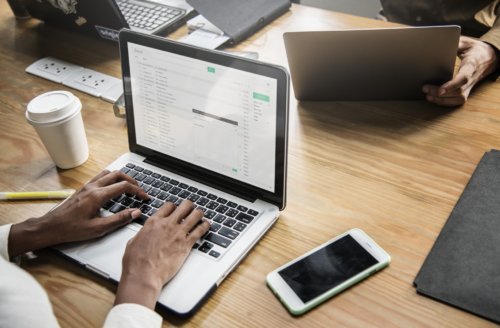
As technology has become ever-present in our lives, a curious phenomenon has developed: the inability to shut our brains up. This is, in part, due to how much less uncertainty we have in our lives now: Google Maps guides us to our destination and removes the worry of getting lost, Amazon keeps us from wasting money on bad purchases thanks to verified reviews, and forecast apps can predictions the weather down to the hour, if not the minute. With technology there’s less room for ambiguity; so when it arises, we’ve no idea how to cope. Anxiety spikes and our brains go haywire.
Take it from someone who’s guilty of responding to questions like, “Want me to get the groceries after work today?” with a variant of, “Hmm? Sorry I wasn’t listening because I was still thinking about that thing I have to do and oh, yeah, that other thing I’ve been meaning to pitch, and… ” Switching off is essential. Not just if you don’t want to annoy your loved ones (in this particular scenario, an argument ensued; I ended up getting the groceries), but also to avoid burnout.
While many of us are anxious with overactive thoughts, finding the off switches in our brains seems to be more challenging than ever. It’s not impossible, however. Here are a few straightforward steps to a more relaxed you:
Compartmentalize
The best way to leave work at work is to change the venue: If you’re living, eating, working, sleeping within the same 300 square feet (ahem, might’ve done that), it’s easy for one part of your life to spill over into another.
If you work from home, make sure you move to a different room. Or if you’re able to concentrate in a café, get out of the house. The public library can be a good spot, too. If you have an office, make sure you avoid bringing work back with you. Whether it’s your “official” laptop, or a file you need to read over for the next day, do it at work and come home carefree and empty-handed.
Change your clothes or wear a uniform
I thought this one was a personal discovery (like the time I thought I’d invented Spanx for sarees), but it turns out other people got there first. My logic was entangled in my uniform from my school days: It had the uncanny ability to make me feel awake and in “school mode.” While, on the other hand, coming home and changing out of it essentially signaled to me that the day was over–sort of like a set of pajamas does before bed. Consistently wearing PJs (thanks, Mum) made me instantly bed-ready.
After self-imposing a uniform for my freelance job (to avoid decision fatigue), I decided to try at-home clothes for home.
And bada-bing-bada-boom, it worked. Once I’m out of my uniform (I have a pre-picked outfit for each day of the week) and into my home clothes (this is where I go wild and decide what to wear on the spot), I’ve essentially changed out of the day.
RELATED: Can being self-employed make you happier?
Schedule a date-night, game-night, fun time
If you’re one of those people who needs every aspect of their life pre-planned, including the spontaneous parts, go ahead and schedule some post-work fun. While this might sound comical to some, to me, it makes sense–if you plan to have fun, you will have fun.

Decrease the number of times you check your work phone and work email
The expectation and the pressure to check work email is paramount. Apparently, it’s called “telepressure.” And while it’s become part of general work culture, I think it can be self-imposed, too. Less than a year ago, when I was a full-time freelancer, I was a 10-times-an-hour email-checker. Spoiler alert: It ended in burnout.
But if we’ve learned anything from the French, beyond wine and cheese pairings, it’s this: Uou shouldn’t have to check your email outside of work hours. Moreover, excessive email checking is counterproductive; unplugging and switching off shouldn’t be a source of guilt. If your employer is giving you a hard time for tuning out when you’re off the clock, address the issue in person. Explain that checking your phone doesn’t strike you as productive for you and see if you can reach a compromise—perhaps they can text to check your mail if it’s urgent.
Setting boundaries, be it during the day-to-day or while on vacation is essential to work-life balance. In the past, I’ve used all sorts of excuses as to why I won’t be able to check my work e-mail (on holiday somewhere remote and won’t have reception—a classic). Nowadays, I set up my out-of-office auto reply email and don’t answer calls. If it’s urgent enough, they’ll keep trying and text.
And guess what? It’s almost never reached that level of urgency.
Really get away from it all when you’re on vacation
If you want to unplug on vacation, make sure you plan ahead! Prepare any work you can do ahead of time, so you can leave knowing you won’t be returning to a pile of papers. If projects simply can’t be put on hold, organize as much as you can before you leave and delegate important tasks in your absence.
Also, make sure everyone knows you are away! You’ll decrease the amount of emails and calls you’ll return to if folks know you’ll be gone. Set up an away-from-work message for your email and voicemail. If you can, include a line about who else people can contact in your absence.
The key to really stepping away: Mindfulness
Dwindling away days on autopilot is exceptionally easy; being aware of your surroundings, your thoughts, your feelings? Less so. The only way you can truly step away from work is by being aware of yourself in the moment. There’s no point in coming home and spending time with your kids if you’re still thinking about that meeting from earlier in the day. Instead, try and focus on the current moment.
‘Mindfulness,’ as the word suggests, is about being mindful of your actions and ideas. Take some time each day after work winds down to do a mindfulness meditation to ground yourself in the present.
There are tons of great mindfulness apps (both paid and free) to guide you through the process of noticing your surroundings. Presumably because we’re so used to everything around us, we take our sensory knowledge for granted. For example, if you’re reading this while seated, are you aware of the points of contact between your body and what you’re sitting on?
While mindfulness sounds like an obvious practice to implement, its benefits extend beyond improved focus and reduced stress levels–put aside its en vogue status and give it a taste for yourself.
Bottom line: There is life beyond work
At the end of the day, your job is half your life. The other half is your life. And to strike a balance between the two, it’s important to treat them as separate entities altogether.
Taking time and mental energy off are perfectly healthy habits to indulge in. In fact, they’ll be key in rebooting your batteries so that you can work effectively. It’s rare (so rare that I couldn’t find an example when I keyed this into Google) that a business truly collapses because someone stepped away from their job in off-hours or took time off. There’s no end to how much work there is, or how much work you’re capable of, but life is finite.


Grok Nation Comment Policy
We welcome thoughtful, grokky comments—keep your negativity and spam to yourself. Please read our Comment Policy before commenting.